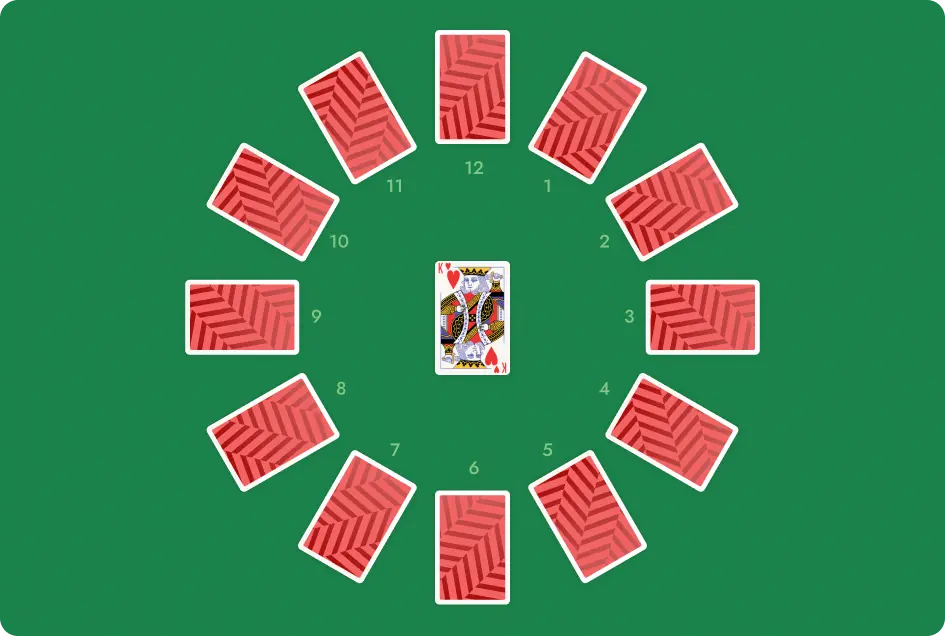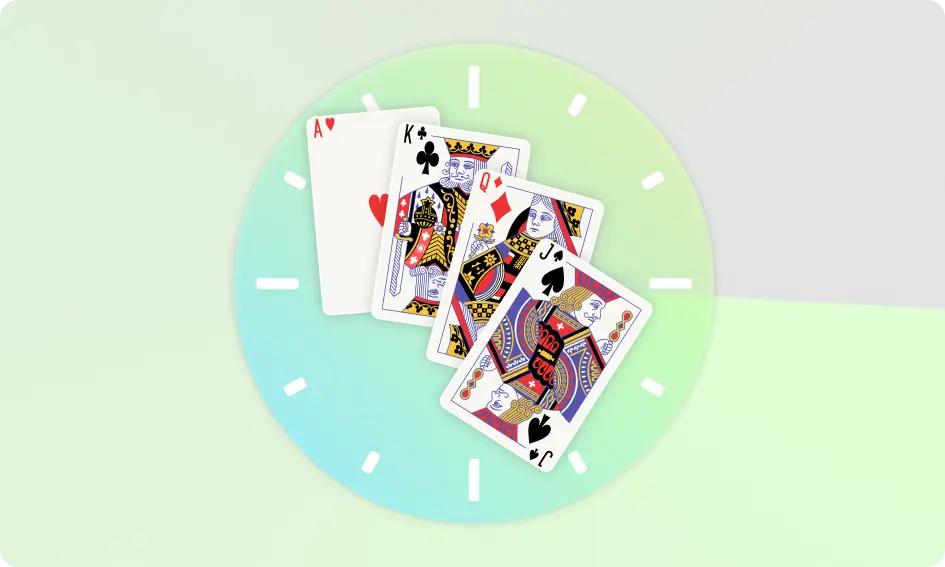Solitaire is a great single-player card game. It can keep you busy for hours throughout the day. But, if you’re like me, then you sometimes get exhausted from all the strategic thinking required to win. There is, however, a Solitaire variant that depends entirely on luck, one that is completely divorced from strategy.
This variant is known as Clock Solitaire – a game of chance that’s perfect for relaxation or perhaps betting among friends. Since experience has no value in this variant, both beginners and seasoned veterans can sit down at the same table and have a blast. If you want to learn how to play Clock Solitaire, then keep reading!
Introduction to Clock Solitaire
Clock Solitaire is popular among newbies (even kids) because it is so beginner-friendly. It’s the first game I recommend to people who are interested in one-player card games (before they transition to the more mainstream Klondike variant).
I’ve played Klondike for as long as I can remember, since childhood. I did not always know that a standard 52-card deck can be used to play something similar but purely chance-based. It was only when I first got access to the internet that I learned about Clock Solitaire. Now I enjoy playing it when I’m unwinding after the arduous grind of strategic variants like Klondike, Spider, and Crescent. Although both Clock and Klondike are played with a deck of 52 cards, there are some notable differences:
| Clock Solitaire | Klondike |
| There are 13 piles of face-down cards in the tableau. | There are seven piles of face-down cards in the tableau, where the topmost card is face-up. |
| There are 7 piles of face-down cards in the tableau, where the topmost card is face-up. | There are foundation piles, where you must sequence 13 cards of each suit in ascending order. |
| You can only move a card to a pile that corresponds to its rank. | You can move a card to another pile as long as the topmost card of that pile is one rank higher than the card you are moving. |
| The game involves no strategy; it is completely based on luck. | the game involves strategy but is partly based on luck. |
| You win the game when all the cards of the same rank are in the correct pile before completing the King pile. | You win the game when you’ve completed all the foundation piles. |
How to Play Clock Solitaire

Now that I’ve outlined Clock Solitaire’s appeal, let’s discuss how you can play the game.
Objective
The objective in Clock Solitaire is to complete all 13 piles of cards, each containing four cards of each rank. You must complete the King pile last. If you complete the King pile before all the other piles, then you lose the game. Your score is then the number of piles completed.
Setup and Dealing
If you’re playing Clock Solitaire online, then it will already be set up. However, if you want to play with physical cards, then follow these steps:
- Take two decks of 52 cards (so Jokers excluded) and shuffle them well. The more randomized the cards, the more authentic the experience.
- Start laying the cards out face-down, one by one into 13 piles of four cards. All the cards must be face-down.
- Arrange 12 out of the 13 piles into a circle, each representing an hour of a 12-hour clock. Then, place the remaining pile in the center. Here is an outline of which rank is supposed to go into which pile:
- Ace cards are played on the pile corresponding to 1 o’clock.
- Duece cards are played on the pile corresponding to 2 o’clock.
- Three cards are played on the pile corresponding to 3 o’clock.
- Four cards are played on the pile corresponding to 4 o’clock.
- Five cards are played on the pile corresponding to 5 o’clock.
- Six cards are played on the pile corresponding to 6 o’clock.
- Seven cards are played on the pile corresponding to 7 o’clock.
- Eight cards are played on the pile corresponding to 8 o’clock.
- Nine cards are played on the pile corresponding to 9 o’clock.
- Ten cards are played on the pile corresponding to 10 o’clock.
- Jack cards are played on the pile corresponding to 11 o’clock.
- Queen cards played on the pile corresponding to noon/midnight.
- King cards are played on the middle pile.
Gameplay Rules
Now that you’ve successfully set up a game of Clock Solitaire, how do you actually go about playing it? Here are the official rules, which dictate what you can and cannot do.
- The first move in Clock Solitaire is always to flip over the top card in the middle pile and place it face-up next to its correct pile.
- You then play the top card from the pile you moved the last card to.
- Every card that you flip over is placed next to its correct pile while remaining face-up.
- You win the game when all the cards in the clockwise pile are in their correct spot before the last King card is played. Otherwise, the game is lost.
Conclusion
As you can probably tell, Clock Solitaire is a really easy game to get the hang of. It is, however, completely normal to lose at this game (I’ve just gone on a six-loss streak in one sitting). It is, however, a relatively light-hearted and casual game to play among friends. Enjoy, and don’t forget to pray to Lady Luck. The outcome in Clock Solitaire is always in her hands!







